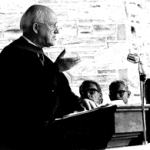The following excerpt is from R.C. Sproul’s book “The Truth of the Cross.”
When we talk about the vicarious aspect of the atonement, and some versions of the Bible will use one of these words and some will use the other one. I’m often asked to explain the difference between propitiation and expiation. The difficulty is that even though these words are in the Bible, we don’t use them as part of our day-to-day vocabulary, so we aren’t sure exactly what they are communicating in Scripture. We lack reference points in relation to these words.
Expiation and Propitiation
 Let’s think about what these words mean, then, beginning with the word expiation. The prefix ex means “out of” or “from,” so expiation has to do with removing something or taking something away. In biblical terms, it has to do with taking away guilt through the payment of a penalty or the offering of an atonement. By contrast, propitiation has to do with the object of the expiation. The prefix pro means “for,” so propitiation brings about a change in God’s attitude, so that He moves from being at enmity with us to being for us. Through the process of propitiation, we are restored into fellowship and favor with Him.
Let’s think about what these words mean, then, beginning with the word expiation. The prefix ex means “out of” or “from,” so expiation has to do with removing something or taking something away. In biblical terms, it has to do with taking away guilt through the payment of a penalty or the offering of an atonement. By contrast, propitiation has to do with the object of the expiation. The prefix pro means “for,” so propitiation brings about a change in God’s attitude, so that He moves from being at enmity with us to being for us. Through the process of propitiation, we are restored into fellowship and favor with Him.
In a certain sense, propitiation has to do with God’s being appeased. We know how the word appeasement functions in military and political conflicts. We think of the so-called politics of appeasement, the philosophy that if you have a rambunctious world conqueror on the loose and rattling the sword, rather than risk the wrath of his blitzkrieg you give him the Sudetenland from Czechoslovakia or some such chunk of territory. You try to assuage his wrath by giving him something that will satisfy him so that he won’t come into your country and mow you down. That’s an ungodly manifestation of appeasement. But if you are angry or you are violated, and I satisfy your anger, or appease you, then I am restored to your favor and the problem is removed.
The same Greek word is translated by both the words expiation and propitiationfrom time to time. But there is a slight difference in the terms. Expiation is the act that results in the change of God’s disposition toward us. It is what Christ did on the cross, and the result of Christ’s work of expiation is propitiation—God’s anger is turned away. The distinction is the same as that between the ransom that is paid and the attitude of the one who receives the ransom.
Christ’s Work Was an Act of Placation
Together, expiation and propitiation constitute an act of placation. Christ did His work on the cross to placate the wrath of God. This idea of placating the wrath of God has done little to placate the wrath of modern theologians. In fact, they become very wrathful about the whole idea of placating God’s wrath. They think it is beneath the dignity of God to have to be placated, that we should have to do something to soothe Him or appease Him. We need to be very careful in how we understand the wrath of God, but let me remind you that the concept of placating the wrath of God has to do here not with a peripheral, tangential point of theology, but with the essence of salvation.
What Is Salvation?
Let me ask a very basic question: what does the term salvation mean? Trying to explain it quickly can give you a headache, because the word salvation is used in about seventy different ways in the Bible. If somebody is rescued from certain defeat in battle, he experiences salvation. If somebody survives a life-threatening illness, that person experiences salvation. If somebody’s plants are brought back from withering to robust health, they are saved. That’s biblical language, and it’s really no different than our own language. We save money. A boxer is saved by the bell, meaning he’s saved from losing the fight by knockout, not that he is transported into the eternal kingdom of God. In short, any experience of deliverance from a clear and present danger can be spoken of as a form of salvation.
ULTIMATELY, JESUS DIED TO SAVE US FROM THE WRATH OF GOD
When we talk about salvation biblically, we have to be careful to state that from which we ultimately are saved. The apostle Paul does just that for us in 1 Thessalonians 1:10, where he says Jesus “delivers us from the wrath to come.” Ultimately, Jesus died to save us from the wrath of God. We simply cannot understand the teaching and the preaching of Jesus of Nazareth apart from this, for He constantly warned people that the whole world someday would come under divine judgment. Here are a few of His warnings concerning the judgment: “‘I say to you that whoever is angry with his brother without a cause shall be in danger of the judgment’” (Matt. 5:22); “‘I say to you that for every idle word men may speak, they will give account of it in the day of judgment’” (Matt. 12:36); and “‘The men of Nineveh will rise up in the judgment with this generation and condemn it, because they repented at the preaching of Jonah; and indeed a greater than Jonah is here’” (Matt. 12:41). Jesus’ theology was a crisis theology. The Greek word crisismeans “judgment.” And the crisis of which Jesus preached was the crisis of an impending judgment of the world, at which point God is going to pour out His wrath against the unredeemed, the ungodly, and the impenitent. The only hope of escape from that outpouring of wrath is to be covered by the atonement of Christ.
IT IS A DREADFUL THING TO FALL INTO THE HANDS OF A HOLY GOD WHO’S WRATHFUL
Therefore, Christ’s supreme achievement on the cross is that He placated the wrath of God, which would burn against us were we not covered by the sacrifice of Christ. So if somebody argues against placation or the idea of Christ satisfying the wrath of God, be alert, because the gospel is at stake. This is about the essence of salvation—that as people who are covered by the atonement, we are redeemed from the supreme danger to which any person is exposed. It is a dreadful thing to fall into the hands of a holy God Who’s wrathful. But there is no wrath for those whose sins have been paid. That is what salvation is all about.


